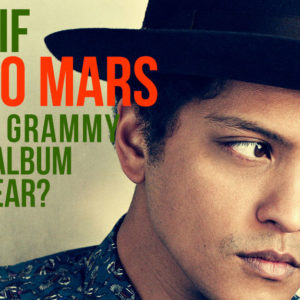This is the final track of first edition of the Extended Play series, a new MusiQology miniseries on a theme or concept that deserves more than a single-article treatment. Giving our contributors the space to explore and develop this type of work is important because the proliferation and justification of concepts is an important skill for academic writing. Like the EP for musicians, these give us, our writers, and our readers the chance to explore themes and concepts, testing them out before delivering the full album.
Over the next several weeks, MusiQology Managing Editor John Vilanova will be doing a deep hypothetical exploration of the 2018 GRAMMY Awards nominees for Album of the Year. Each article will ask the same question of a different artist: “What would a win by this artist mean?”
Donald Glover’s been having a moment for a while now.
He swept the 2017 Emmys, winning Best Director in a Comedy Series and Best Actor in a Comedy Series for Atlanta, his idiosyncratic-but-specific look at black life in the southern mecca. He was the first black person to win the former award. And, latest but not least, the GRAMMYs have surprisingly nominated his musical nom-de-plume Childish Gambino for five golden gramophones for Awaken, My Love!, a fascinating release that moves from his off-kilter rap efforts—2011’s Camp and 2013’s Because the Internet—deep into funk far away from wherever Bruno Mars has been spending his time.
The GRAMMYs are notoriously late to the proverbial party. It took them 4 years to incorporate rock and roll despite its complete omnipresence and domination at the awards’ turn of the Sixties beginnings;; reggae’s first year as a category came four years after Bob Marley’s passing; and the first Best Rap Album award didn’t come until 1996. Motown Records earned one win in the 1960s. Chuck Berry’s first GRAMMY was for Lifetime Achievement!
Given all that, it’s convenient timing for the GRAMMYs that Glover’s Awaken, My Love! dropped in early December 2016, an awkward window two months into the 2018 awards cycle, but before the 2017 awards had aired. Adele hadn’t yet beat Beyoncé. Kendall Jenner hadn’t yet ended acrimony between the police and black America with a Pepsi can. “Bodak Yellow” hadn’t rewritten the record charts’ record books.
In addition to being in its own time, Glover’s record is striking because of its combination of uniqueness and deference to a specific black musical past. No other record released in 2016 (or 2017) sounded like this—an atmospheric Seventies slow-jam of funk and R&B that also made time to remind us to—in the parlance of our times—to “stay woke” in its Record of the Year-nominated single “Redbone.” From the opening chant—“I’m in love when we are smokin’ that la-la-la-la-la”—to the earnestly sung finale of “Stand Tall,” this is tasting menu of outre black music. There’s punchy synths, emotional vocoder implementation, Funkadelic’s frizzly guitars, singalong chants, and Sly and the Family Stone-style choruses. It’s a remarkable survey of the once-Afrofuturist palette realized in a present.
And so, in a lot of ways, we’re rooting for Awaken, My Love! It’s the weirdest Album of the Year nominee in a long time. That’s intended as high praise both for Glover and the GRAMMYs, but it also raises an important question: What does awarding a weird black album over a more mainstream one mean?
Black artists haven’t won the Album of the Year in the last ten years, and they’ve only won the prize three times this century: OutKast in 2004, Ray Charles in 2005, and, of course, Herbie Hancock in 2008. I think there’s a case to be made that none of those were zeitgeist-seizing records. Instead, they were a duo with a specific and idiosyncratic catalogue; a career-retrospective; and a jazz-fusion legend playing Joni Mitchell covers.
There’s a kind of fascinating irony here: The black music that the Recording Academy has most celebrated in the 21st Century is off-center and quirky in two of the three cases. (Charles’s win is akin to The Artist’s 2011 Best Picture Oscar—an industry’s nostalgic celebration of itself that didn’t pass muster even as the show’s final credits rolled.). But what also has to be said in a conversation about weird black music is that it privileges a kind of auteurist ideal, where the creator resists the allegedly easy-to-produce hip-hop soundscape and makes something unique.
In his wonderful book Just Around Midnight: Rock and Roll and the Racial Imagination, Jack Hamilton argues in a chapter about Bob Dylan and Sam Cooke that the former and artists like him are discursively framed as individuals, who through strength of will and individual genius, make their contribution to the musical landscape. The “black community,” the argument goes, is the true author of Cooke’s work. It is rhetorically positioned as a collective endeavor to delegitimize the artistry and significance of individual black artists.
This same pernicious logic, we might argue, might bleed into how some Academy voters hear and understand hip-hop, which often emphasizes crews, sampling, and other processes that situate work as part of a context and continuum. Given the dearth of hip-hop winners in recent years, though, this might be at least a partial explanation. And further, in this case, we see what happens when among the black music-makers, certain exceptional fantastics emerge: They win GRAMMY Awards.
Awaken, My Love! is a wonderful pastiche of old and new, and as deserving a candidate as any in this Album of the Year field. But should Glover’s name be called on Sunday, it bears asking: Is he winning because of his blackness? Or in spite of it?

 Share On Facebook
Share On Facebook Tweet It
Tweet It




